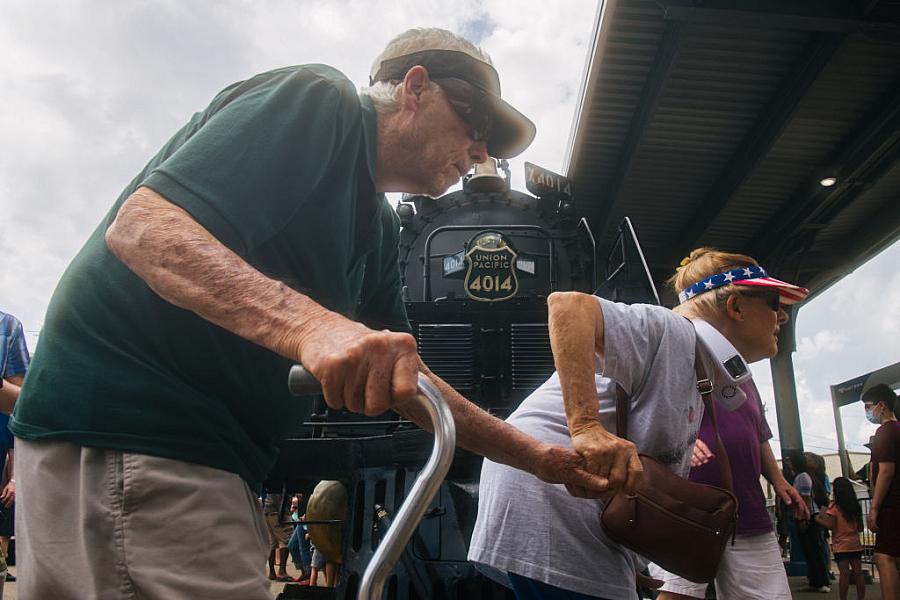Texas’ Medicaid program cruelly leaves caregiving spouses behind

Photo by Brandon Bell/Getty Images
As I learn more about unpaid caregiving in the U.S., I reflect on the story of my parents. My mom, at age 24, took care of my dad, age 33, for six years from 1985 to 1991. My dad’s hospital bed took the place of our dining table in our living room. He was diagnosed with brain cancer and was no longer able to work as letter carrier for the U.S. Postal Service, a job he loved. My family lived on one disability check and donated money and meals from my dad’s former coworkers. Recently, my mom revealed that my dad suffered from depression at the end of his life. He hoped that cancer would take him quickly, so that my mom could collect death benefits.
The legacy of undervaluing caregiving remains. There are approximately 41.8 million unpaid family caregivers in the U.S. In Texas, if a person needing care qualifies for Medicaid, they can designate a family member to be their caregiver. But that family member cannot be a spouse. Texas is among 31 states where spouses aren’t allowed to become paid caregivers through Medicaid.
In Texas, a qualifying resident might care for a critically parent or child, but a dying spouse — they’re on their own. In my reporting for the 2023 National Fellowship, I’m exploring why this exclusion exists. I hope to interview couples who are currently impacted by this rule (and no doubt struggling financially), and explore how this impacts communities of color and LGBTQ+ couples who are able to legally marry but now confront a barrier that they may not have foreseen.
When I contacted Texas Health and Human Services Commission to ask for the reason why a spouse would be forbidden from caring for their partner, they said that service coordinators assess whether natural, unpaid support is available to the Medicaid recipient. “Allowing spouses to be paid caregivers could impact the level of natural, unpaid support provided by the spouse, which could impact program costs,” a representative said.
I’ve yet to fully understand what the representative meant. What I do know is that in 2021 there were over 3 million family caregivers in Texas, providing $41 million in unpaid care, according to a study by AARP. Nationwide, family caregivers provided $600 billion in care.
The U.S. saves billions of dollars by foisting the labor of unpaid care on people who are already living in poverty and at high risk for cancer and other terminal diseases. During the pandemic, unpaid family caregivers were not acknowledged as heroes. For the most part, their work was invisible.
It’s not always clear to people why Texas has refused to expand Medicaid, turning away $5 billion dollars in federal Medicaid funding in 2022 alone. Conservatives ultimately think of health care subsidies as handouts that create dependency on the state. These ideologies are the reason Texas leads the nation in uninsured people. with one in five people lacking health insurance.
Among those individuals on Medicaid, 312,145 people are on waitlist for Home and Community Based Services (HCBS), which offers caregivers help with transportation, food, and personal care. Washington state has a waitlist of zero.
It’s difficult to trust that the Texas legislature understands that there will be a growing number of critically ill people who will need long-term care. Attorney General, Ken Paxton is currently suing COVID-19 vaccine manufacturers, claiming that lifesaving vaccines were essentially a hoax. The Texas House voted to impeach Paxton after years of corrupt conduct. Meanwhile caregivers desperate for resources, endure political scandals, and wait to be heard.
On March 31, Texas began “unwinding” 5.9 million people from Medicaid after the end of the public health emergency declaration. Understaffed by hundreds of staff members, there are bound to be people who lose coverage who should not have during the redetermination process. Another key development has been a rise in cancer in Texas and nationwide. With women’s health woefully underfunded, the American Cancer Society estimates that Texas will see 22,280 new cases of breast cancer in 2023, the third highest in the U.S. They predict the state will have the second-highest death rate.
My motivation as a journalist is to bring to the forefront the stories of people impacted by outdated policies and show just how they impact people in their daily lives. People should not have to fight tooth and nail for help, during their darkest moments. And couples should know they are not alone.
My goal is to bring national attention to a state like Texas, since it is a test case that highlights what can and does go wrong. I hope that a story about love, much like my parent’s love story, will cut through the minefield of bureaucracy and refocus our attention on what matters — peoples’ lives.
